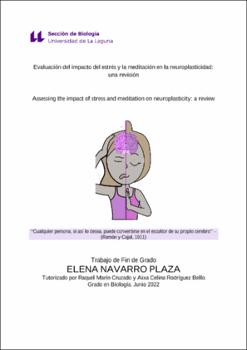Evaluación del impacto del estrés y la meditación en la neuroplasticidad: una revisión
Autor
Navarro Plaza, ElenaFecha
2022Resumen
El estrés crónico es una de las enfermedades silenciosas más comunes en nuestra
sociedad. Desde la pandemia causada por el COVID-19 se ha observado un aumento
alarmante de su incidencia en la población. Existen evidencias de que procesos como la
neurogénesis y la plasticidad se ven afectados profundamente por el estrés crónico. En
concreto numerosos estudios han demostrado que induce neuroplasticidad en la amígdala,
disminución del volumen y conexiones en el hipocampo y corteza prefrontal, así como
estimula la actividad glial y por lo tanto potencia la neuroinflamación. Entre los diferentes
tratamientos para este tipo de trastorno, la práctica de la meditación ha resultado ser una
herramienta de intervención terapéutica beneficiosa en el largo plazo incluso en individuos
que no lo padecen. Gracias a las alteraciones beneficiosas que proporciona la meditación en el
cerebro, mejorando la conexión entre la corteza prefrontal e hipocampo, aumentando el
volumen del hipocampo y cerebelo, así como disminuyendo el volumen de la amígdala con su
repetida práctica y amortiguación de la neuroinflamación, permite no sólo contrarrestar los
efectos del estrés, si no ayudar en su prevención. Chronic stress is one of the most common silent diseases in our society. Since the
pandemic caused by COVID-19, there has been an alarming increase in its incidence in the
population. Research shows that processes such as neurogenesis and plasticity are profoundly
affected by chronic stress. Particularly, numerous studies have shown that it induces
neuroplasticity in the amygdala, and a decrease in the volume and connections in the
hippocampus and prefrontal cortex, as well as a role as stimulator of glial activity, and
therefore a booster for neuroinflammation. Among the different treatments for this type of
disorder, the practice of meditation has proven to be a beneficial therapeutic approach in the
long term even so in individuals who do not suffer from the affliction. Thanks to the
beneficial alterations that meditation induces in the brain, enhancing the connection between
the prefrontal cortex and the hippocampus, increasing the volume of the hippocampus and
cerebellum as well as a decrease in the volume of the amygdala with repeated practice and
neuroinflammatory buffer, proving that it allows not only to counteract the effects of stress,
but also aid in the prevention of stress.





